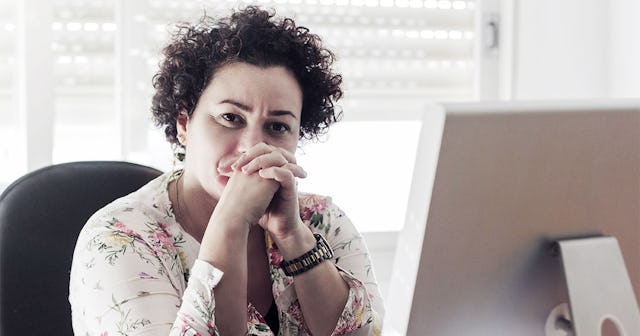I Thought My Anxiety Was Typical, But It Wasn't

Everyone has faced anxiety at one time or another, whether or not they realized what it was. We’ve all had concerns about minor events like taking a test or going on a first date, and real worries like becoming a parent or a loved one falling ill.
Before therapy, I thought this was the only type of anxiety that I had experienced as well — the kind that can be just written off as a typical human feeling anxious. I initially went to therapy to help sort out feelings about a potential divorce, as after 12 years with one person, there is no such thing as an impartial third party among your friends. What I learned there is that I was suffering from more than just confusion and a busy mind.
Anxiety and depression are mental health terms that I was familiar with but would never have used them to describe myself. I thought my anxiety was normal for an adult. As my mother once put it, “we come from a line of worriers.” I thought that because I had never contemplated ending my life, I could not have been depressed.
As it turns out, it is not so normal. Coming home from work and immediately crawling into bed to watch TV all night every night, not normal. Feeling like you don’t deserve to have a happy or exciting life, not normal. Worrying so much about every impending event that it is impossible to enjoy yourself at any given time, not normal. Especially when I had so much that I should have been enjoying, all bundled into a little onesie with a bow stuck to her head.
I was hoping that, since this grand diagnosis had been made, there would be a clear path to feeling better. That’s what happens when you go to the doctor after all, right? They give you the appropriate medicine, and then you’re healed. I quickly learned that it is not so simple with mental health disorders. I was equipped with some tools to help control everything, and though the bad feelings can be quieted during good times, they are always lying quietly behind your active thoughts, ready to attack at any sign of weakness.
There are times that I forget that it’s even there. When I’ve been excelling at work, pushing myself at the gym, planning lots of fun events with my kindergartner, I begin to feel like a confident person who can take on anything. But then I stay up late one night to finish a movie, and the next day, the anxiety gets control of the steering wheel. If I don’t contribute enough in a meeting, I start to think I’m not qualified enough for my job. If I let my daughter watch a TV show while I do some dishes, I worry that she’ll become a screen addict and that I’m a bad parent. If my partner asks if everything is okay, I think that he’s unhappy spending time with me and will eventually leave me as everyone else does. None of this is true. My brain knows that. But when anxiety takes over, logic is no longer a consideration.
And when a particular trigger is hit, that’s when the real fun starts. And by fun, I mean panic attacks.
They always come when I’m already anxious. But then another level is added, usually a pre-existing sensitivity, and it spirals hard and fast. Before I know it, I feel as though I’m in a bubble that separates me from the rest of the world — things look hazier, sounds seem muffled and further away, and suddenly everything stops. There are no more thoughts swirling around in my head, it’s just darkness and pain. It passes, as it always does, but living in it for a few minutes can seem like an eternity.
Thankfully, these attacks are few and far between. They tend to reappear with more consistency during hard times, like when I was in the middle of my divorce and after my beloved pet passed away suddenly. But the tools that came from therapy can help sometimes. When I find the time to meditate, this usually calms the anxiety down a bit. Music works more reliably for me. I created a calming Spotify playlist that I turn on when I feel the anxiety start to get bad, and as long as I do this before it is all consuming, it can tame the wild beast.
John Mayer wrote a song about the ups and downs that come with the end of a relationship called “Emoji of a Wave.” Though the song is not about anxiety, I have started to repeat the course to myself every time I feel myself start to slide into full-blown anxiety or a panic attack:
Oh honey
Oh honey It’s just a wave It’s just a wave and I know That when it comes I just hold on I just hold on
Music is my method of coping, but may not work for everyone. But what I hope does help is talking and reading about it. If this helps anyone else feel not so alone, then it is well worth the risk of exposing my own vulnerabilities. If you ever feel like you need help dealing with your own mental troubles, please ask for help. You do not have to deal with this by yourself.
This article was originally published on